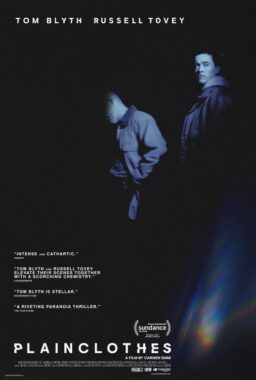CANNES, France — Suddenly I am aware of Emily Mortimer. I of course must have seen her in “Scream 3” (2000), but she made no impression. She was in “Notting Hill” (1999), but went unmentioned in my review. Then in “Lovely & Amazing” (2001) she had a scene of astonishing bravery in a film that was, yes, lovely and amazing. And then in the last few months have come “A Foreign Affair” (2003), “Young Adam” and now “Dear Frankie,” which is a great success in the Un Certain Regard section of this year’s Cannes festival.
In these four most recent films, Mortimer displays a screen presence so confident in such different ways that you sense she will not be found in “Scream 4.” It takes great roles to make a great actress, and now she has found them.
Consider “Dear Frankie,” written and directed by Shona Auerbach, in which she plays Lizzie, the mother of a 9-year-old deaf boy (Jack McElhone). “He wasn’t born deaf,” she says at one point. “That was a present from his dad.”
She fled the brutal father, but as Frankie has grown up she has written him letters, supposedly from his dad, a sailor whose ship sails foreign ports. Now Frankie has seen his father’s ship in port, and wonders if his father will come to see him. So Lizzie, Mortimer’s character, hires a complete stranger (Gerard Butler) to play the father for one day.
This story could supply conventional melodrama, but Auerbach cuts it close to the bone. Lizzie is a defensive woman, protective of her son, and the last thing she expects is that Frankie and the stranger will become friends — and that she, who has so fiercely kept men out of her life, will become attracted to him, too.
A full review must wait for the film’s U.S. opening. But there is one scene that fascinates me. Lizzie and the stranger are saying goodbye. Something has happened between them. Neither one was expecting it, but both know it. At the door, they look at each other for a very long time, while we wait to see if they will kiss. A very long time.
“It was mechanical, actually, in the way we shot it,” Mortimer recalled. We were talking in a penthouse across the street from the Palais des Festivals. “We shot several takes. The director knew it had to be long, but she didn’t know how long, and she had to go into the edit and find out which length worked.”
The shot goes as long as it reasonably can, and the longer it runs, the more it means. It finds a way to close the movie without the usual squirmy cliches. “She is a very brave director in that way,” Mortimer said, “allowing space around the action. She gets what she needs but doesn’t descend into sentimentality.”
In “Lovely & Amazing,” Mortimer has another extraordinary scene involving the human gaze. The film, by Nicole Holofcener, is about four women: a mother, her two grown daughters and her adopted young African-American daughter. All four have issues with their body images.
Mortimer plays an actress who takes a meaningless date to bed, and then stands naked before him, asking him to honestly and frankly evaluate her body, its strengths and weaknesses. It must have taken some courage, I said, to invite criticism in that way.
“It was a wonderful experience as an actor to have that opportunity,” she said. “You hear this terrifying phrase, ‘being in the moment.’ I have no doubt that I was in that moment. She was exposed and ridiculous and brave. And you know, in many nude scenes in the movies, that’s what’s going on in the minds of the actors, anyway. They’re thinking about their imperfections.”
In “Young Adam,” she plays the girlfriend of a barge worker (Ewan McGregor) who treats her with horrifying cruelty while, until the end, she deceives herself that he cares for her. In “A Foreign Affair,” she’s a British filmmaker, making a documentary about American men who take package tours to Russia to shop for brides. Two dramatically different roles, but especially in “A Foreign Affair,” there is the sense that as she regards one of the Americans (Tim Blake Nelson), there is something she feels and is waiting for him to notice it. Remarkable, how she wins our attention by withholding, instead of acting out.
Mortimer was born in 1971 in London, studied English and Russian at Oxford, and is married to the American actor Alessandro Nivola; they had a baby son in September 2003. Her father, John Mortimer, is the author and attorney whose Rumpole of the Bailey has become a British institution. Although Mortimer has a perfect American accent when needed (why do the Brits do us better than we do them?) she is often used for British period stories. She played in the epic BBC-TV version of Anthony Powell’s 12-novel series “A Dance to the Music of Time,” which followed a circle of characters from before the first world war until after the second.
And her next film is “Bright Young Things,” directed by Stephen Fry and based on the early Evelyn Waugh novel.
“It’s about that time between the wars,” she said, “when people were allowed to do anything apart from saying how they really felt. It was a mad party time when everybody was trivial as a matter of principle. They were expected to behave extremely badly and go to parties and take drugs and have lots of boyfriends, but the moment you had a sincere emotion, you had to keep it very much to yourself. And you have two characters in this world who do love one another but aren’t allowed to express that, and get so confused their relationship blows up.”
In this character and in many of her others, she said, “I seem to find characters who are held back and guarded, physically and mentally. It’s a relief after the film is over, being let off the hook and being allowed to be my usual self again. But when I’m acting, it’s good to have something to play against, boundaries to break.”












